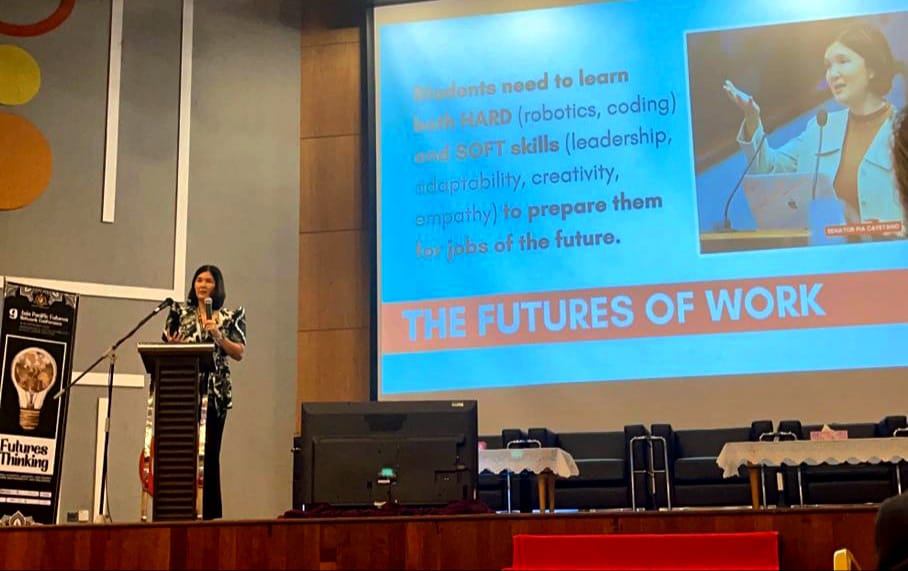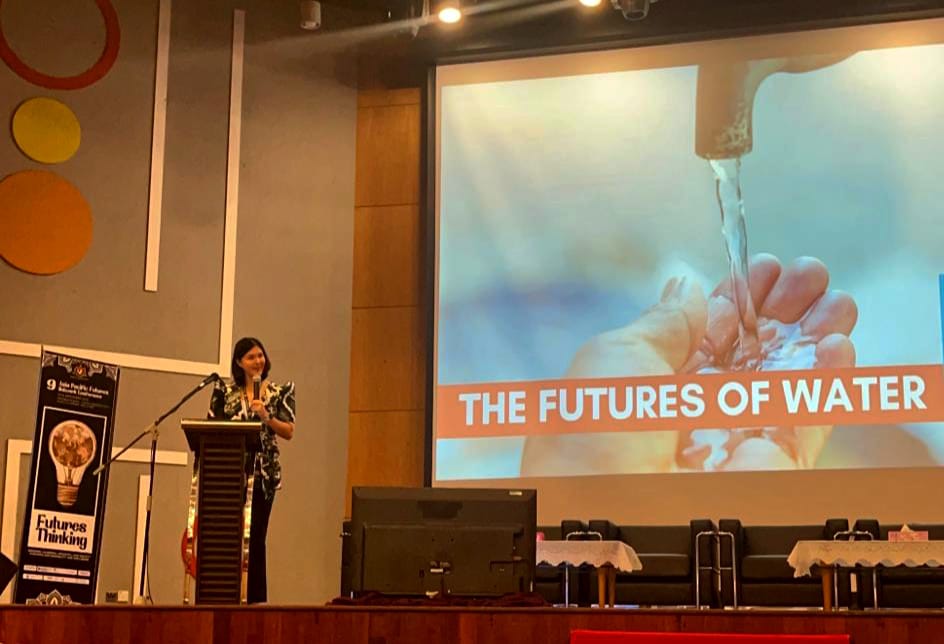Leaders must work not just for the welfare of the present, but also future generations
Transcript of the keynote speech of Senator Pia S. Cayetano*
9th Asia-Pacific Futures Network Conference, Kuala Lumpur, Malaysia
It’s a pleasure to be with all of you today. So I am a senator in the Philippines. I am an elected official. Am I the only elected official in this room? So by choice, I am a government official. I came here by choice.
So I’m really happy to join all of you. I do take pride in sharing the work that we’ve done. I think there is a great need for more elected officials to take time and become explorers. I pride myself to be one. I probably do a little bit more vacationing sometimes than exploring. But that’s just the balance in life that I choose to do.
So let me tell you a little bit about my work. In 2019, I was reelected to the Philippine Senate after 12 years of being a senator and 3 years of being a member of the House. So I was reelected for my third term. And I pushed for the creation of the very first Committee on Sustainable Development Goals, Innovation, and Futures Thinking. So that’s been in place for four years. We’re actually now in another Congress and we were able to keep this Committee there. So hopefully, it’s there to stay now.
And I want to share with you the work that we have done since this committee has been put into place. So the main goal really here is to track where we are with the SDGs. This is the work that I’ve done as a member of parliament and also actively participating in the Inter-Parliamentary Union, which is the largest and oldest organization for members of parliament. So that’s my inspiration.
And then, we prepare for various futures. As many of you may have encountered, introducing this topic raises a lot of eyebrows, a lot of laughs. But I mentioned the timeline, I introduced this when I was reelected after two terms, so it was already my third. So I had already some amount of seniority, and I could not have done it when I was younger. It requires that you can push some things around to be able to get that done. So I did push some things around. And then to shift our mindset to futures thinking as a major policy reform. So shifting this mindset is a constant struggle for me. But I’ve seen it has become easier over time precisely because I’m like a broken record that my colleagues just have to keep on hearing and hearing and hearing until I somehow feel that my message is getting through. There are only 24 senators in the Philippines, by the way. So it’s like a small classroom of kids who never grow up and we just have to keep listening to each other.
So they’re now used to hearing me say these things and a lot of them will look to me sometimes now, which is very pleasant, very rewarding, to get my input. Not that I can ‘see the future,’ as you all know. But it’s really just me reminding everyone that ‘let’s pause and let’s explore the different scenarios that we should be prepared for.’ It could be good, it could be bad, it could be boring, whatever. But let’s at least discuss this.
So just some examples of our work. The Committee was set up in 2019, so as you know, shortly after, it was COVID, so my very first official action really was filing a resolution to investigate how COVID-19 affected various sectors and when I read this I’m like, should I include it? I mean, we all know what we went through but it was very interesting at that time because it was also my opportunity to meet Dr. Sohail Inayatullah online, and other futurists, Dr Tuomo Kuosa and Saku-Juhani Koskinen of Futures Platform in Finland. And it was very interesting for me. I continue to be a student of futures thinking. And it was an opportunity for me to bring in people who could not go vacationing, they had to be explorers at that time by listening online.
So, we did that and let me just jump into more work on the futures of health. I don’t know, we had so many hearings on the futures of health and we used COVID as a jumping point to have these kinds of interesting discussions. And right now, so that was in the previous Congress, and right now, we’re diving deep into this because the Philippines…we are the providers of healthcare. We are the ones losing healthcare workers to developed countries who are also in need of healthcare workers and using our healthcare workers. And to be very blunt, I call it ‘modern-day colonialism’ because developed countries… I don’t know if they are recruiters or if they are connected to their governments… go to our universities and entice the students and offer them scholarships while they are still students. A few years ago, they waited for them to practice for two years before they enticed them to move to their countries. Now, they are going to the universities and there actually have been cases where they recruited the whole department of a hospital, which was really bad.
So these are the discussions we are having now because we need to prepare for this kind of reality that the world needs healthcare workers, and the Philippines is a great provider of healthcare workers. So how are we going to deal with that?
I’ll move forward to education. This is extremely interesting for me because my first committee report is on the Future of Education, my first and only. And the reason I emphasize that so far, it’s the only committee report I’ve produced, because so much time is taken, as I said, tracking, intervening with the discussions going on that to actually sit down and write the committee report takes a lot of time. So, so far that’s been the only committee report.
But aside from the Department of Education, I also handle the budget of education, health, and cultural agencies. So for the last 4 years, I have been able to put in funding for futures thinking in the Department of Education, in the Department of Health, and in the Department of Science and Technology. So we actually have with us today representatives from two universities in the Philippines, where are you, ladies? There you are, hello. So we’re really happy that they were able to join us because every year, and hopefully, every year, I will have the ability to do that. We’ve put in funding for the research and for their capacity building.
What is interesting is after three years, the National Expenditure Program (NEP), this is the volume of numbers that our Department of Budget produces every year that will dictate the budget … [has included in its objectives] securing a future-proof and sustainable economy, which for me is a win. It starts with a title, and hopefully, the discussions and depth is revealed over time.
So just to show you a few more examples of the work that we do, we’ve also started discussions on the futures of cities and transportation. And the outcome of that would be the Walkable and Bikeable Communities Bill, which we passed in the Senate. So that is actually a committee report but in the form of a bill that will become a law. I am just waiting for the House of Representatives …[to take its action on this measure.] In connection with the sustainable cities and communities focus, I filed a bill, and this is also about greening, and having food security.
The very important hearing I also had in the last few months is the future of water. I won’t say much about it except that it’s something that concerns me. My birthday happens to be on World Water Day. March 22. But I just found out years after it became an issue that I’d like to work on. And much work has to be done. So if there are any experts here, I’d love to chat later.
And the future of work. So in connection with my work in education, I’m always tying this up to what kind of students are we producing? What kind of citizens? It was mentioned earlier that education doesn’t have to just happen in the classroom. But we need to educate our children, and what are the most effective ways? Because at the end of the day, we need the kind of people who will work towards the empowerment of our country. So that is something that we’re also looking at.
And, I think I will end there. I always include in my discussions the need for intergenerational fairness. We, as policymakers, who are tasked by our Constitution to finalize the budget, I feel are limited sometimes to make decisions that affect the voting public. But that’s why I always try to elevate the discussion that it is our sworn duty to also look into the welfare of the future generation, to children who are not yet born. It’s a little bit hard for politicians to grasp that. Because a politician would always want to be reelected. But it’s a discussion that I feel always has to be had.
So on that note, thank you for this opportunity to join this amazing conference. And I wish everybody the best. #
*Senator Pia Cayetano chairs the first-ever Senate Committee on Sustainable Development Goals, Innovation, and Futures Thinking



Leave a Reply